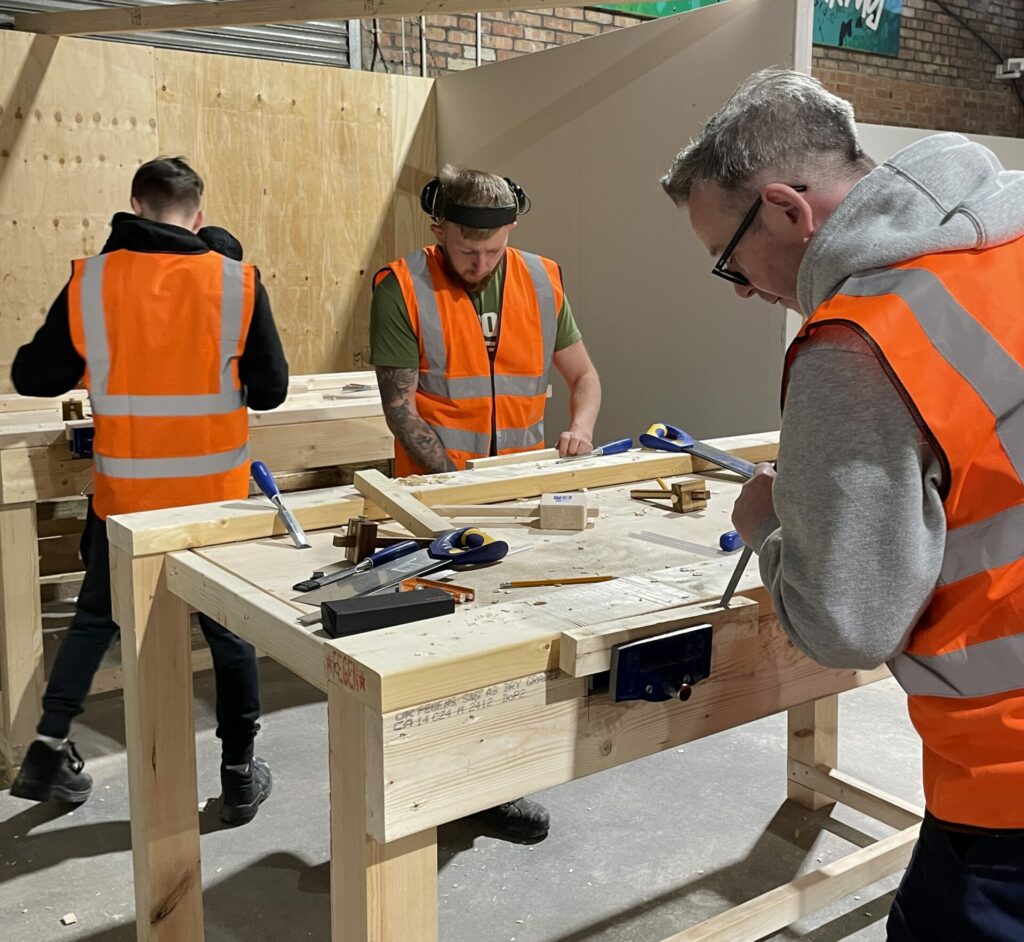
Sustainable Towns and Cities
Upgrading homes in North East England: the case for action
Our policy briefing for national, regional and local government shows how retrofit can tackle the region’s fuel poverty and unemployment challenges.
Explore

Supported by:




Making homes in North East England energy efficient is more vital than ever – but the number of upgrades through government schemes has fallen dramatically. By reversing this decline, national and local government can boost economies, improve health and tackle fuel poverty across the region.
This briefing sets out policies that can accelerate action, and trailblazing schemes ready to be replicated or scaled up. Ashden urges North East MPs and councillors to lobby central government and opposition parties to deliver change – and also to drive forward effective policies and partnerships at a local and regional level.
Our national policy asks include a £60bn, 10-year national retrofit strategy, as well as further incentives such a fiscally neutral land tax rewarding more efficient homes. We also call for policymakers to devolve funds to the region and local areas (through allocation rather than competition), and to embed training in government-funded schemes.
- Read our policy asks in full.
The UK’s housing stock is one of the least energy efficient in Western Europe, bringing high carbon emissions and eye-watering fuel bills. The need to upgrade homes is particularly urgent in North East England, where the combination of low average incomes and an older population has tragic consequences, with more cold-related deaths than in other parts of the country.
An ambitious home retrofitting programme in the region could unlock better health, lower carbon emissions, and boost jobs in construction, low carbon heating and smart home energy controls. The North East has the highest proportion of economically inactive people in the UK, and think tank IPPR North reports £7bn per year in a national retrofit programme could create 60,000 local jobs. This investment would benefit the region twice as much as equivalent spending in wealthier parts of the UK.
Despite the clear need for action, the last year has seen a dramatic fall in the installation of government-funded energy efficiency measures. Between January 2022 and August 2023, just 539 homes in the region were upgraded through the government’s Sustainable Warmth Scheme, compared to 4,288 between August 2020 and June 2022 upgraded through the previous iteration of the scheme. 1,664 homes were upgraded through the government’s ECO scheme between April 2022 and March 2023, compared to 8,616 in the previous year.
We estimate that households in the North East could be missing out on lifetime energy bill savings of over £50m, calculated using figures published by E3G.
One bright spot has been the North East region’s success in upgrading homes through the Social Housing Decarbonisation Fund, though the 1,800 homes upgraded through this scheme are a small fraction of the region’s fuel poor homes.

This briefing, informed by our work with local authorities in the North East sets out barriers to progress, pathways to change and examples of best practice – recognising that regional trailblazers are already showing the way forward. Home upgrades are needed across the UK – but in North East England, the impact of action would be particularly striking.
Short-term policies block progress
Disjointed schemes and stop-start approaches are undermining efforts to improve homes in the North East.
One of the main barriers for councils is the existence of numerous, short-term competitive funding streams with ever-changing eligibility criteria for the types of homes and households that can benefit.
Energy efficiency improvements for low-income homes are funded through three main streams:
- ECO, delivered since 2013 by energy providers with many households referred by councils; the latest iterations of this funding are ECO4 and ECO+ now re-branded as the ‘Great British Insulation Scheme’
- the Social Housing Decarbonisation Fund, delivered by councils and housing associations
- The Green Homes Grant scheme, delivered by councils, which has been rolled out in several phases, the latest of which is the Sustainable Warmth fund.
Despite pressing need, few homes in the North East have benefited from ECO funding since January 2022. This is due to delays in the announcement of new funding rounds, and eligibility criteria that focus on homes off the gas grid. The new Great British Insulation Scheme has broader eligibility criteria but is less generous – campaign group National Energy Action estimates that it could take a further 300 years for the scheme to fully address the governments’ own fuel poverty targets.
Funding for council-led retrofit schemes, introduced in 2020, has been welcomed across the country. But the short-term nature of funding streams creates a constant process of bid-writing, with local authorities best placed to navigate the process attracting a high proportion of funding. Analysis by not-for-profit consultancy Regen shows that English regions with the highest fuel poverty and coldest winter climates are not receiving the most funding through government schemes. Ever-changing eligibility criteria and the barrier to blending financing streams that this creates mean that it is difficult to plan strategically, or deliver a street-by-street area-based approach to retrofit.
Short term funding also creates uncertainty for the supply chain, and for education providers who are left reluctant to invest in training. The North East has just 3% of all the UK’s construction workers. This reflects low house building rates in the region, but home retrofit will require thousands of insulation installers, retrofit co-ordinators and low carbon heating technicians, so a major ramp up in training is needed. But funding uncertainty has caused some local businesses to collapse, discouraging others from participating in future programmes.
There is little policy support for the retrofit of homes in the private rented sector. In the North East 28% of rented homes are deemed ‘non-decent’ and many tenants struggle with fuel poverty. The Prime Minister’s Net Zero announcement in September confirmed that proposed increases to Minimum Energy Efficiency Standards (MEES) in the private rented sector will be dropped so there will be no relief for renters. For owner-occupiers that are not fuel poor, there are few incentives to retrofit their homes, and lower property prices and incomes in the North East can result in prohibitive upgrade costs.
Taking the initiative: time to build on existing good work
Despite the barriers above, local authorities across the North East region have recognised the urgency of making homes more energy efficient. Councils have upgraded over 4,500 households in the region since 2021 through earlier iterations of government funding schemes, which had eligibility criteria that were better matched to the North East housing stock. To make it easier for local authorities to find reliable contractors to deliver these schemes, local procurement organisation NEPO has set up a procurement framework for retrofit and low carbon heating.
The North of Tyne Combined Authority has prioritised home retrofit as part of its plan to achieve net zero emissions and create good green jobs. Following an assessment of local housing stock, the Combined Authority has modelled retrofit scenarios to meet net zero and is now funding the development of a business case for a regional one-stop-shop. This would provide advice and support for non-fuel poor households.
To help close the skills gap, the North East Local Enterprise Partnership has conducted a detailed analysis of future market demand, and the current provision training providers to inform a 10 year plan for the delivery of retrofit skills. This will cover new roles such as retrofit co-ordinator as well as installation roles in fitting insulation, and low carbon heating.
Investment in retrofit can also accelerate innovation. Digital technologies can facilitate mass-scale retrofit, and the Newcastle Low Carbon Neighbourhood project is exploring digital surveying using drones. This approach can map out options for improving insulation and installing low carbon heating, as well as identifying damp and mould risk.
Case studies - pioneering initiatives from the North East and beyond

Newcastle City Council is a regional leader on retrofit, especially when it comes to prioritising the most vulnerable. The authority has worked closely with its own housing association, Your Homes Newcastle, and with EQUANS, a firm based in the city that supports energy transitions across the UK and around the world.
A major success for this trio was installing ground source heat pumps in two social housing tower blocks in West Denton. The blocks’ residents are mainly over 55, and many had experienced health problems after underheating their homes in response to high fuel costs. The blocks had also seen an excessive rate of boiler failures and high demand for repairs.
Installing heat pumps has moved these tenants off fossil-fueled gas heating and given them more control through smart thermostats. In a time of energy crisis, these residents are better able to manage their bills.
Customer engagement teams from Your Homes Newcastle and EQUANS were in touch with tenants right from the very start of the project, including the design phase, and visited regularly throughout the works. Weaving resident engagement throughout the project – as a joint responsibility of housing association and contractor – was a key lesson from the scheme. Driving behaviour change was crucial too, which is why tenants and council staff were given training related to the new smart heating controls.
Newcastle is replicating its success at three other tower blocks in the city, bringing new insulation, high performance windows and communal air source heat pumps to 270 more flats, with work starting in late 2023.
“It’s been more than a year since I had the system installed in my flat, and I can only praise the new heating system – the more time it’s been in, the more I like it and can see the benefits. I think anyone who has the opportunity to get a similar system installed should get it done if they have the chance, it’s absolutely marvellous’
– Laurence Rodden, Residents’ Association Chair
The authority is upgrading more homes via the government’s Social Housing Decarbonisation Fund this year, renovating the bungalows of 84 older people. The properties will be given a full-works facelift with solar PV, external wall insulation, loft insulation, new windows, and improvements to ventilation with a further 157 non-traditional duo-slab homes also receiving similar upgrades.
Once again Newcastle has found that, despite being resource-intensive, face-to-face contact with residents is vital for engaging vulnerable residents. The council is partnering with Northumbria University to observe and quantify the benefits of the bungalow retrofits – something that councils often lack the time and resources to do by themselves.
A month before the work began university researchers collected indoor air quality and energy use data, and interviewed residents about the state of their health. The researchers will return after the renovations have taken place to document any changes. Quantifying retrofit benefits in this way will give Newcastle the solid evidence needed to turbocharge its future funding bids.

The North East, like every region of the UK, is short of skilled retrofit workers. At the same time, many employability schemes leave trainees at a dead end, with no onwards progression after their learning is over.
RE:geon is an innovative green skills training provider based in Sunderland. Founder Nadia Scott, who has almost two decades of experience as a woman in construction, is determined to connect the dots between businesses and trainees in the North East. Her approach fills urgent skills gaps and helps more people, including marginalised young people, find work.
RE:geon is part of regional employer the RE:GEN group. With a direct line into a major construction firm, RE:geon links training to real job vacancies. Through its Route to Retrofit course, RE:geon circumvents the traditional recruitment process and provides local businesses, big and small, with the high calibre candidates, knowledgeable in retrofit, that they desperately need. Designed alongside businesses, this course can be tailored to the employers’ needs.
RE:geon has worked with North East firms like Elvet Chartered Surveyors, Isoler and Fortify Solutions – all undergoing rapid growth to fulfil retrofit contracts and needing new staff. For each, RE:geon has run a tailored marketing campaign to recruit ideal candidates. Campaigns have included ‘meet the employer’ Q&A sessions and link-ups with local colleges. 71% of trainees scouted for Fortify Solutions were employed after completing their course.
RE:geon is also committed to nurturing the green construction workforce of the future. Recognising that young people need to see it to be it, the organisation’s Green Skills Safari tours for pupils aged 10 to 18 take students aged 10 to 18 and their parents to real building sites.
Ahsanur Rahman was previously unemployed but secured a role at Fortify Solutions after a course at RE:geon. Gaining experience in loft insulation and cavity wall extraction, Ahsanur said: ‘The training that [RE:geon] provides you is literally equipping you with all the qualification for the interview and the job role that you’re potentially going to do, so I feel it’s very beneficial.’
Andrew Haworth was working at a supermarket but also had a Level 2 qualification in bricklaying plus a Level 3 in construction in the built environment. Through RE:geon, he gained his first experience of working on a real construction site, shadowing quantity surveyors from Elvet Chartered Surveyors.
Andrew compares RE:geon’s approach to the normal job application process: ‘It’s really frustrating to apply for these roles that I feel competent and able to succeed in, and quite often get overlooked. So, in [RE:geon’s] process, I found it very beneficial to meet the employer. It was a chance to prove myself and show enthusiasm. I got training specifically for the role I interviewed for.’
Council retrofit efforts are often undermined by the complexity and ever-changing criteria of multiple government funding schemes. But Sunderland City Council has shown what can be achieved under a generous and flexible scheme, Local Authority Delivery Phase 2 (LAD 2).
One factor that contributes to fuel poverty is poor energy efficiency – this is measured by Energy Performance Certificate (EPC) ratings, where anything above a C rating is considered good. But 110,000 homes in the Sunderland area have an EPC rating of D or below. Most are heated with gas and have already had basic levels of insulation installed. As a result, some fuel poor households in the area meet the income criteria for certain government schemes but are excluded from them because of their property characteristics.
The LAD 2 scheme, on the other hand, gave councils the flexibility to do what is best for their housing stock, with few centrally-imposed criteria. It allowed Sunderland to offer residents an easily understandable ‘retrofit menu’ of different measures, including solar panels, insulation (loft or underfloor), heating controls or hybrid heat pumps. Between January and September 2022, £2.5m was spent improving 215 properties, with average spend per house of £10,000.
The council found that solar panels were the hook that got many residents interested in getting work carried out. Once they had seen the panels successfully installed, these residents came back for more. So, even though solar panels do not technically count as a ‘retrofit’ measure, because they do not improve energy efficiency or reduce energy demand, they were a gateway towards greater uptake of such measures.
The funding enabled a customer-led experience, rather than the council dictating what measures were best for each property. This amplified the project’s reach, as tight knit communities shared their positive experience with friends and neighbours. A key lesson was how social peer-to-peer marketing is often most effective for promoting retrofit.

Leeds faces similar problems in its housing stock to areas of the North East: lots of brick-built, back-to-back terraced homes with solid walls, occupied by residents facing high levels of deprivation. Yet, despite the challenging nature of its housing stock, Leeds City Council has cracked the code for area-based retrofit – renovating many or all homes in a neighbourhood at the same time, regardless of the type of property and who owns it.
Typically, funding criteria force local authorities to take a scattered approach, retrofitting homes of the same type or tenancy even if they sit on opposite sides of a city. This is often complex for the local authority, inefficient for contractors and brings no benefit at a community level.
Leeds has flipped the script by identifying priority neighbourhoods and developing a more cohesive approach which not only focuses on home improvements, but on other issues linked to deprivation, including debt advice, selective licensing for private landlords, and action on anti-social behaviour.
Tying area-based retrofit into wider regeneration has raised quality of life in unloved neighbourhoods while simultaneously making retrofit efficient, less costly, and easier to manage with better buy-in from all sides.
Leeds’ Holbeck neighbourhood ranked in the top 1% of the UK’s most deprived areas. Here the city council dedicated £10m to upgrading 300 homes, first making them weathertight and then improving energy efficiency with news windows and doors, loft insulation and external wall insulation.
95% of residents agreed to have the work done, with average home temperatures rising from 12°C to 18°C, improved physical and mental health, hundreds of green jobs created, and 85 tonnes of CO2 saved per home over their lifetime.
Lessons shared by the authority include that blended finance is the crucial ingredient for area-based retrofit. Leeds brought together ECO funding, LAD funding, contributions from landlords and support from the Local Enterprise Partnership.
The council advises use social housing as a catalyst in priority areas, which helps to kickstart work in private properties, and targeting at least 100 homes to allow contractors to commit to a permanent presence in the area.
The authority suggests making sure there is partial funding for all property and tenancy types, as many owner occupiers will be unable to participate otherwise. Finally, it recommends relying on the ‘scaffolding effect’ to secure buy-in from private households. Establishing a noticeable presence, where neighbours can see scaffolding go up on surrounding properties, builds trust and reassurance.
Recommendations for national government
Retrofit strategy
- Implement a National Retrofit Strategy as set out by the Construction Industry Training Board (CITB) to be delivered over 10 years with £60bn public funding, providing the long-term certainty for businesses, training providers and private finance to invest in retrofit.
Finance and regulation
- Replace the current disjointed and inflexible retrofit schemes, by devolving funds to local areas through allocation rather than competition. This should build on the trailblazer deals for Greater Manchester Combined Authority and West Midlands Combined Authority announced in the Spring 2023 budget.
- Introduce further incentives and finance for retrofit, including a fiscally neutral variable stamp duty Land Tax rewarding more efficient homes. Government should also create a revolving loan fund and/or low-cost finance for home energy retrofitting
- Introduce as soon as possible the proposed regulations on the energy performance of private rented homes, so these homes are rated EPC C by 2028.
Information and advice
- Launch a national public information campaign on home energy saving which includes advice on retrofit and can be tailored for local authority use, and provide support for community-led promotion of retrofit.
Skills
- Create a retrofit skills mission, with a national retrofit skills plan. This should include apprenticeship reform, funding and support for FE colleges, the development of skills and career pathways, and a national publicity campaign to attract trainees.
- Integrate skills development into government-funded retrofit schemes by setting minimum procurement criteria to encourage local authorities to stimulate skills development through the retrofit programmes that they commission and deliver, setting training targets for suppliers.
- Ensure that government funded retrofit schemes allow sufficient delivery time to secure training objectives – for officers employed by councils and housing providers as well as craft-trades, project managers, retrofit assessors and co-ordinators. Each grant should include a dedicated amount for training.
- Reform the apprenticeship system to make it easier for small and micro-businesses to take on apprentices. Incorporate retrofit into existing construction qualifications including T-Levels, and invest in further education colleges to develop training facilities and upskill instructors.
Recommendations for local and regional authorities
Local and combined authorities are already cooperating across the North East on retrofit. Possibilities for deeper collaboration include:
- Building on the retrofit procurement framework developed by regional procurement body NEPO, set minimum requirements for construction and heating contractors to train local people as part of the social value clause in procurement contracts. This would ensure that local people are equipped to take on jobs in the growing retrofit sector.
- Bring Tier 1 contractors and manufacturers of insulation and low carbon heat technologies together with colleges to ‘train the trainers’ and offer expert sessions,
- Advocate for trailblazer deals on retrofit, like those in Greater Manchester and the West Midlands mentioned above. Securing these for the new North East Combined Authority and Tees Valley would allow more local control of retrofit funding.
- Share expertise on data-gathering to better understand housing stock in the region, how people use energy in their homes and which retrofit measures are most suitable, building on innovative approaches such as Newcastle City Council’s digital surveying.
- Use the experience gained from retrofit schemes already delivered across the region to improve on residents’ experience of retrofit, taking inspiration from Hartlepool Council who are working with local social enterprise Hartlepower to provide advice to residents, and handhold them through the retrofit process.
Local authorities across the North East have shown that they can deliver successful programmes to retrofit local homes but current government policy and funding arrangements mean that they are operating with one hand tied behind their backs. An ambitious retrofit strategy that devolved long term flexible funding to the region could cut fuel poverty, improve resident health and deliver good local jobs.